Liberdade de expressão: teorias, fundamentos e análise de casos / Freedom of Expression: Theories, Foundations and Case Analysis
Keywords:
Liberdade de expressão, Direitos fundamentais, Direito comparado/ Free speech, Fundamental rights, Comparative Law.Abstract
DOI: 10.1590/2179-8966/2020/44121.
Resumo
A pesquisa versa sobre o direito fundamental à liberdade de expressão, busca delimitar sua extensão e aplicação na jurisprudência norte-americana e brasileira. Apresenta as principais teorias desenvolvidas pelos juristas norte-americanos, assim como as críticas e desafios que estas enfrentam. A partir dessa revisão bibliográfica aponta os argumentos que fundamentam o direito, assim como as hipóteses que o desafiam, caso do discurso de ódio, pornografia, fake news, a regulação da mídia em períodos eleitorais e da obrigatoriedade da exibição de alguns conteúdos. Além de uma abordagem dogmática, é realizada também uma analítica, com o estudo de alguns casos das principais cortes dos Estados Unidos e do Brasil, ao final de que, desenvolvido um estudo comparativo entre as decisões dos dois países. A conclusão obtida é a de que a proteção concedida pelo Estado brasileiro à liberdade de expressão não é pautada em critérios decisivos claros, estando, portanto, sujeita a um elevado grau de imprecisão e insegurança.
Palavras chave: Liberdade de expressão; Direitos fundamentais; Direito comparado.
Abstract
In this paper, we investigate the fundamental right to free speech, its extension and applicability in the American and Brazilian jurisprudence. To do so, we present a literature review of the main theories developed by American jurists, as well as the critics and challenges that they face. Through these elements, we discuss a set of arguments that support the right to free speech and some opposite hypothesis that challenge its content, such as hate speech, pornography, fake news, regulation of media during election season and the obligation to exhibit some sensible contents. Following this dogmatic approach, we provide an analysis of some cases of the main courts of the United States and Brazil, developing a comparative study between the decisions taken in these countries. Further, we conclude that the protection granted by the Brazilian state to freedom of expression is not based on clear decisive criteria, and is therefore subjected to a high degree of inaccuracy and insecurity.
Keywords: Free speech; Fundamental rights; Comparative Law.
Downloads
Downloads
Published
How to Cite
Issue
Section
License
The authors the sole responsibility for their texts.
It is allowed the total or partial reproduction of the articles of the Journal Law and Praxis, if the author is mentioned.
This work is licensed under a Creative Commons Attribution-Noncommercial-Share Alike 4.0 Unported License.
This license allows you to copy and redistribute the material in any medium or format for any purpose, even commercial, provided the original authorship is cited.
This work is licensed under a Creative Commons Attribution 4.0 International License.



